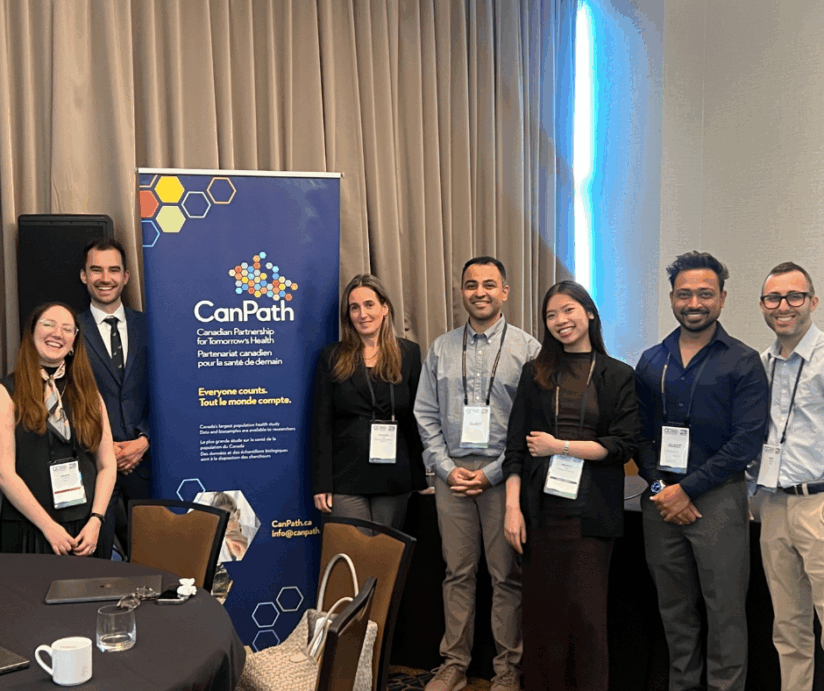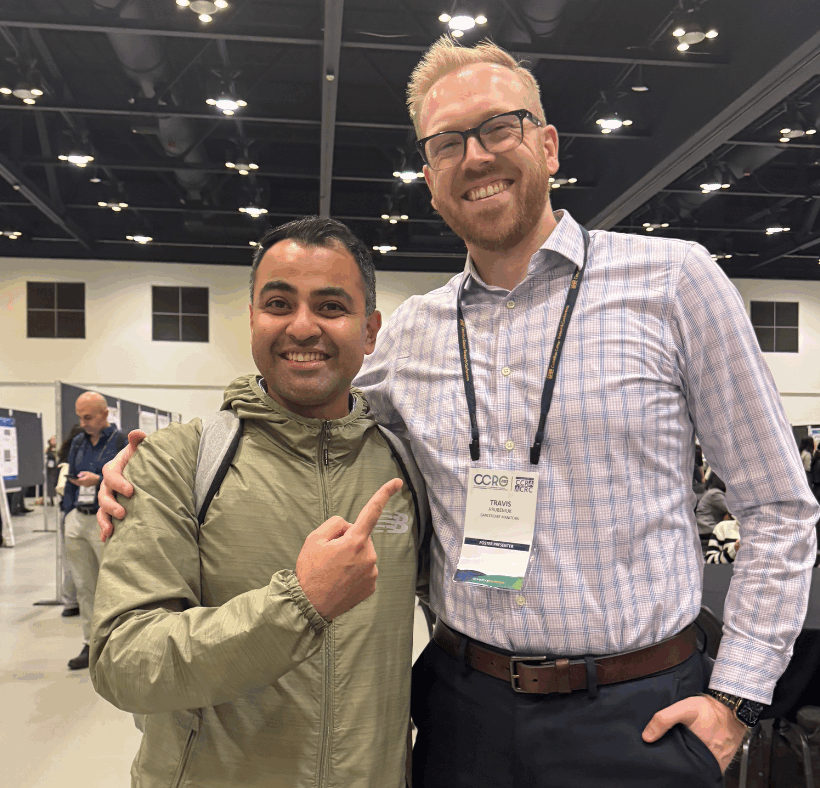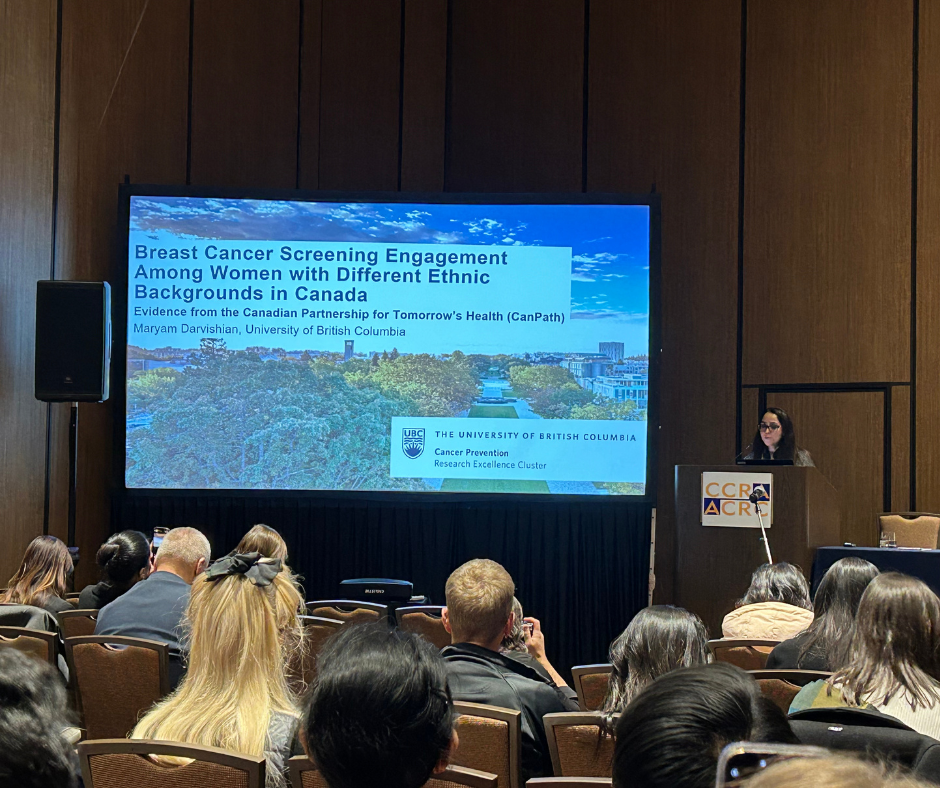CanPath at CCRC 2025: Connection, collaboration, and cancer research across Canada

More than 1,300 people came together in Calgary for the Canadian Cancer Research Conference (CCRC) 2025, creating an inspiring atmosphere of ideas, energy, and community. For CanPath and our regional cohorts, the meeting is one of the few times each year when our pan-Canadian team gathers in person to learn from one another, support our colleagues, and reflect on the collective impact we’re making on cancer research across the country.
This year’s conference highlighted just how interconnected our work has become. From poster sessions and oral presentations to hallway conversations and hands-on training, CanPath-supported research was visible across disciplines, regions, and career stages.

Showcasing researchers from across Canada’s population health cohorts
Throughout the conference, CanPath and regional cohort teams filled the poster and presentation rooms with new insights rooted in population-level data. We caught some excellent talks, including:
- Dr. Maryam Darvishian (University of British Columbia) shared findings on breast cancer screening engagement among women with different ethnic backgrounds in Canada, and later presented on provincial variation in cervical cancer screening adherence.
- Dr. Parveen Bhatti (BCGP/HEAL/CHARM) presented new work using BCGP and ATP data to examine light at night as a potential cancer risk factor.

Across the poster sessions, we also saw work from:
- Dr. Travis Hrubeniuk (MTP) on building and maintaining a population-based cohort
- Katarina Maksimovic (OHS/OICR) on Ontario’s biobanking resources
- Dr. Sam Kenston (BCGP) on the built environment and cancer prevention behaviours
- Laura Grant (ATP) on research opportunities and the Alberta Cancer Research Biobank
- Dr. Grace Shen-Tu (ATP) on leveraging cohort data and biosamples for chronic disease insights
- Dr. Sara Nejatinamini (ATP) on geospatial disparities in cervical cancer screening

It was also meaningful to celebrate when fellow researchers uplifted our work. In a plenary session, Dr. Darren Brenner gave a special shout-out to CanPath’s data infrastructure and research efforts in his talk, “Peaks and Valleys: Trends in early-onset cancers in Canada.”
Between presentations, the sense of connection was palpable. Our teams shared lunch in the convention centre, reunited with colleagues from across the country, and attended sessions together, reflecting a true “once a year we all meet in the same place” feeling.

HEAL and CHARM: Advancing research on diet, activity, and metabolic health
The HEAL and CHARM studies were strongly represented this year, with two posters that sparked ongoing discussions on the future of lifestyle and cancer research:
- HEAL poster: An overview of how HEAL will enable researchers to examine diet and activity across the cancer trajectory using new questionnaire data linked to CanPath and regional cohort information. HEAL data will be available in 2028, opening the door to a wide range of research questions.
- CHARM poster: A closer look at unravelling heterogeneity in dietary intake and metabolic health, contributing to precision cancer prevention work. CHARM data will also be available in 2028.

It was inspiring to see Dr. Rachel Murphy, Dr. Jennifer Vena, Dr. Parveen Bhatti, and Alyssa Milano sharing updates, answering questions, and connecting with researchers who are eager to work with these future datasets.
Hands-on learing through our Synthetic Dataset Workshop
CCRC also marked our second in-person Synthetic Dataset Workshop, a three-hour session introducing researchers to CanPath’s synthetic dataset and Trusted Research Environment (TRE).
Our team — including Jeff Brabec, Sangram Keshari Sahu, and Nate Raine from Lifebit, and Dr. Victoria Kirsh, Nguyet Ngo, Sheraz Cheema, and Megan Fleming from CanPath — guided attendees through simulated CanPath data, showing how the TRE enables secure, cloud-based analysis.

Participants were fully engaged, and many stayed long after the workshop ended to ask thoughtful questions. Some of the themes included:
- Training and future opportunities: Participants asked whether CanPath plans to offer more workshops, courses and training modules, hackathons, and synthetic data learning events. Thank you for your feedback! This interest will help shape our training strategy for 2025-2026.
- Student access: A common question was whether students can request access to the synthetic dataset. The short answer is yes, if it’s part of a course, training event, or supervised learning context. Students working independently can submit a project proposal with a supervisor and institutional details.
The enthusiasm in the room — especially from early-career researchers — affirmed the role synthetic data can play in preparing the next generation of analysts to work with real CanPath data.
Want to explore the synthetic dataset and platform yourself?
Questions? Email us at apply@canpath.ca
Looking ahead
CCRC 2025 captured what makes Canada’s cancer research community so strong: collaboration, curiosity, and a shared commitment to improving health outcomes. CanPath is proud to be part of this work — and excited to keep supporting researchers, trainees, and partners across the country.
Stay tuned for more updates from our network, upcoming events, and new opportunities to engage with CanPath data.
For more information, please contact:
Megan Fleming
Communications & Knowledge Translation Officer
Canadian Partnership for Tomorrow’s Health (CanPath)
info@canpath.ca